|
|
|
Sort Order |
|
|
|
Items / Page
|
|
|
|
|
|
|
| Srl | Item |
| 1 |
ID:
171128
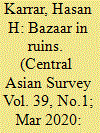

|
|
|
|
|
| Summary/Abstract |
Since 2013, there have been multiple fires in bazaars in Almaty, Kazakhstan. Most of these fires have occurred in Barakholka, the largest bazaar in Central Asia, known for wholesaling in apparel, shoes and low-quality household and office supplies. Ownership of Barakholka is opaque. Using recurrent Barakholka fires as my point of departure, this article contributes to scholarship by describing how the clearing of old bazaars is followed by new property developments and the imposition of new rent regimes. In doing so, I argue that fire – a form of ruination that not only destroys property but also severs networks and people's relationship to a place – is illustrative of how the bazaar, as a new institution within an emerging post-Soviet market economy, was moulded by private interests, and repeated, often ruinous assertions of control over property. I also argue that this process was embedded in a larger political economy that sought to ‘civilize’ the earlier marketplaces. This article is based on ethnographic interviews and repeated visits to the Barakhola between 2016 and 2018, and media accounts of the fires.
|
|
|
|
|
|
|
|
|
|
|
|
|
|
|
|
| 2 |
ID:
185113


|
|
|
|
|
| Summary/Abstract |
There is a resurgent interest in the study of ‘urban commons’ in critical geography scholarship as a way to reimagine cities beyond the pervasive neoliberal framing. Inspired by this body of work, this paper explores the processes through which marginalised groups, despite their many socio-economic limitations, negotiate and transform their sparse urban resources into ‘commons’ to survive in cities. We use qualitative interviews and participant observations to examine two case studies of informal settlements in Dhaka and Khulna city in Bangladesh. The ‘commons identikit’ is used to analyse how informal settlers negotiate survival by enacting particular social relationships among themselves and beyond, ensuring access, use, and exchange of materials and ideas, as well as distributing care, benefits, and responsibility of their commons. By bringing a commons perspective to the pre-existing and emerging local tactics, we highlight the logics and relationality that help these communities make efforts of collective survival and aspire to a better future. We argue that there are significant practical benefits to recognising the self-organising logics of the precariously positioned communities in the city. Furthermore, commoning the city constitutes a major extension of the theorisation of urban informal settlements and the city as urban commons.
|
|
|
|
|
|
|
|
|
|
|
|
|
|
|
|
| 3 |
ID:
179107
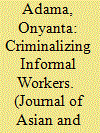

|
|
|
|
|
| Summary/Abstract |
The article examines the criminalization of street vendors in Abuja, Nigeria. It draws on the debate on informality, legality and rights, to highlight the tensions surrounding the law as a mode of regulation. As documented, ideology provides the rationale for the criminalization of street vending. The activity is deemed inimical to the modernist ideals of a clean and functioning city. Enforcement of the law is accompanied by the harassment of vendors. However, vendors remain on the streets by circumventing the law. The article highlights the shortcomings of a simplistic approach to the governance of informality. It cannot be legislated away.
|
|
|
|
|
|
|
|
|
|
|
|
|
|
|
|
| 4 |
ID:
188940


|
|
|
|
|
| Summary/Abstract |
Recent research on the informal sector has devoted considerable attention in examining how informal traders have been affected by the coronavirus in different temporal and spatial settings. However, less well understood is the extent to which central and local governments can cunningly use the veil of COVID-19 pandemic to regulate and re-shape the informal sector. Seeking to remedy this shortcoming in the prevailing accounts and utilising a qualitative research methodology including observations, discourse analysis, critical review of policy pronouncements, by-laws, legislation, video evidence from city officials, government, health authorities, vendors associations, newspapers articles and through a case study analysis of Harare City in Zimbabwe. The article contributes to the academic and policy discussions on how law, disease outbreak, policy and governmentality of African urban spaces intersect.
|
|
|
|
|
|
|
|
|
|
|
|
|
|
|
|
| 5 |
ID:
190945


|
|
|
|
|
| Summary/Abstract |
This article analyzes the significant events that led to the emergence and growth of the online Indian audio-visual sector. The principal argument that drives this narrative is the co-evolution of Indian formal and informal media economies that led to the media industries’ digital transformation. Drawing on historical analysis of the Indian film and television industries, we argue that just as the informal means of finance, social relations, illegal cable and satellite distribution had a formative influence on how these industries formalized, the Indian online audio-visual sector is driven by distinctive formalization processes, led by creators who are engaging with both local and global UGC-led platforms as well as PGC-led portals. Using a critical media industries framework, with data gathered from semi-structured interviews with ‘above-the-line’ Indian online media practitioners together with trade press literature, we propose an analytical framework that incorporates both platforms and portals as industrial objects for mapping digital production cultures that originate as inherently informal.
|
|
|
|
|
|
|
|
|
|
|
|
|
|
|
|
| 6 |
ID:
171129


|
|
|
|
|
| Summary/Abstract |
Based on ethnographic fieldwork in China and Georgia, this article traces the origins and describes current practices of post-Soviet tourist trading in Yabaolu Market in Beijing. While traders from across the Caucasus visit Yabaolu, my focus is on Georgian traders who today perceive themselves as biznesmeny. Focusing on a typical trade visit, the article explores the role of ethnic and kinship ties in the organization of this trade. It questions the notion of ethnic entrepreneurship and the idea that ethnic cooperation itself may serve a basis of trust and underpin traders’ activities. Instead, the article illustrates how enduring transnational linkages are built on other forms of reliability and reputation. These are framed in the lexicon of friendship, as well as kinship and pseudo-kinship vocabulary, and facilitate commercial transactions between traders of different ethnic, social and religious backgrounds in an environment where state regulation and legal law enforcement are almost absent.
|
|
|
|
|
|
|
|
|
|
|
|
|
|
|
|
| 7 |
ID:
192300


|
|
|
|
|
| Summary/Abstract |
Building on anthropological developments in the study of the state that highlight its margins, informal connections, and everyday dynamics, this paper examines the diverse strategies that Tanchangya villagers employ while negotiating peace and ‘development’ processes with local state actors in the Chittagong Hill Tracts (CHT), Bangladesh. It shows that the state is manifested in various forms at the local level. In a myriad of forms of encounters with state actors, Tanchangya villagers employ situated strategies of avoidance, engagement, and resistance. The paper claims that these strategies ultimately contribute to challenge the dominant processes that confine Tanchangya villagers to a state of marginalisation, and aim to aid in the struggle to create greater spaces for the social, economic, and political dimensions of their lives. Thus, this paper offers an analysis of micro-power struggles that take place in the CHT’s rural spaces vis-à-vis the complex matrix of peace, citizenship, and ‘development’ in the region.
|
|
|
|
|
|
|
|
|
|
|
|
|
|
|
|
| 8 |
ID:
182487
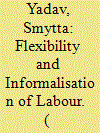

|
|
|
|
|
| Summary/Abstract |
In this article, I demonstrate, through the use of the life course perspective, how informal work in the form of verbal wage contracts might lead to dignity and autonomy amongst the rural poor. The article draws attention to a broader comparative context of how indigenous autonomies are produced. In that they have the relative freedom to engage in a range of informal work as discussed, the Gonds’ autonomy in a neoliberal sense consists of self-governance, which draws attention to the indigenous community’s conception of the self as an economic and autonomous entity that is sustained by a range of social networks.
|
|
|
|
|
|
|
|
|
|
|
|
|
|
|
|
| 9 |
ID:
171126


|
|
|
|
|
| Summary/Abstract |
This article approaches ‘informal’ modes of organization among Uyghur bazaar traders in Xinjiang and Kyrgyzstan in a complex context of increasing state regulatory measures and strong social networks. It captures this organization as a ‘formal side of informality’. The practices comprising it are deemed ‘informal’ from a state-centred perspective, as they are not regulated by the state law or bureaucracy, but they still display a non-state formalization in the sense of being codified, regular and predictable to the traders. The article explores areas and examples of such ‘informal’ formality in the bazaar trade that are built around notions of morality, piousness, pride and shame. It pays special attention to oral contracts, purchase on credit, go-betweens and the status of profit. The article draws on participant observation and interviews in Xinjiang and Kyrgyzstan as well as on descriptions of trade morals and trade customs in ethnographic and folkloristic publications by local Uyghur scholars in Xinjiang.
|
|
|
|
|
|
|
|
|
|
|
|
|
|
|
|
| 10 |
ID:
186632


|
|
|
|
|
| Summary/Abstract |
Despite the extensive literature on the nexus between civil society and democratization in non-democratic regimes, most existing scholarship focuses on politically oriented and claim-making civil society organizations. While these accounts provide useful insights, they appear to rely on Western-centric understandings of civil society. Undoubtedly, little space exists in non-democratic regimes within which civil society organizations may engage in overt political activism due to governmental restrictions. Notwithstanding these restrictions, there are politically less threatening social arenas, where it is possible to identify informally organized civil society initiatives with the potential to redefine and influence long-term state–society relations. This article argues that what we might think of as civil society initiatives in non-democratic regimes cannot be satisfactorily understood through the lens of Western-centric understandings of civil society. Instead, we should focus on informal civil society initiatives. These processes will be illustrated through the case study of mahalla institutions in Uzbekistan.
|
|
|
|
|
|
|
|
|
|
|
|
|
|
|
|
| 11 |
ID:
092515


|
|
|
| 12 |
ID:
095055
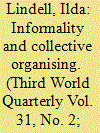

|
|
|
|
|
| Publication |
2010.
|
| Summary/Abstract |
This paper is a conceptual exploration of the dimensions of the contemporary politics of informal economies, from the vantage point of collective organising by 'informal workers'. It inquires into the formation of the political subjectivities and collective identities of informal actors. The importance of the relations between their organisations and other organised actors is illustrated with a discussion of emerging alliances with trade unions. The transnational scales of collective organising by 'informal workers' are addressed. The paper suggests an analytical approach that takes account of the diversity of organised actors, of a variety of governing powers and of the various spatial scales of social struggle involved in the politics of informal livelihoods today. The reflections are informed by the considerable social and economic differentiation contained in informal economies and emphasise the importance of the great diversity of actors, positions, agendas and identities for understanding the complex and contingent politics of informality. Empirical illustrations are drawn from the African continent, but the discussions in the paper address wider trends and theoretical debates of relevance for other developing regions.
|
|
|
|
|
|
|
|
|
|
|
|
|
|
|
|
| 13 |
ID:
191080
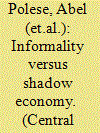

|
|
|
|
|
| Summary/Abstract |
This article is the first attempt to apply Putnis and Sauka's approach to direct measurement of the shadow economy through a survey of company managers in Central Asia. The results of the survey are used to calculate a shadow economy index for 2017 and 2018 in Kyrgyzstan, and to discuss the difference between direct and indirect methods in calculating the size of a shadow economy. We also propose a distinction between shadow economies and informality in general. While a shadow economy is usually understood to arise as a consequence of underreporting of income, we argue that informality is best understood as the aggregate of non-monetary and non-economic practices used in society. Applying this distinction to our case, we suggest that the origins of Kyrgyzstan's shadow economy are not only economic; rather social and cultural processes have had significant effects. This has implications for policy responses that address shadow economic activities.
|
|
|
|
|
|
|
|
|
|
|
|
|
|
|
|
| 14 |
ID:
140391


|
|
|
|
|
| Summary/Abstract |
Informal sector actors played a key role in Mumbai’s resilience to disastrous floods in 2005. Members of small-scale retail and service sector businesses, the city’s underclass, its waste workers and scrap dealers and sundry individual tradespersons such as electricians, plumbers, masons and sanitary workers were at the heart of recovery and rehabilitation in the weeks following the floods of July 2005. These floods not only affected significant parts of the city’s new Central Business District (CBD) and business sectors but also its poor and marginalized communities that lived in environmentally fragile and marginal locations. Ironically, these actors have also been at the receiving end of distorted urban planning initiatives, real estate growth, bourgeois environmentalism-inspired middle-class activism and ethnic chauvinist political forces which have pushed them to the city’s social, economic, and spatial margins. Hence, the aforementioned reasons have made the lives and livelihoods of these actors quite precarious and insecure. Going with recent sociological attempts to bridge the expanding field of disaster studies and classical sociological theorization by linking development theories to the study of disasters and their social implications, this paper argues for more imaginative disaster mitigation and management strategies that recognize the role of informal sector workers in post-disaster resilience. It is argued that this recognition should be accompanied by formal state sponsored institutional inclusion and integration of informal sector workers and actors in disaster governance. In Mumbai, informal economic actors were characterized by resourcefulness, access to key networks in enabling recovery, flexibility and innovativeness in design and planning, and the ability to offer low-cost options which could be rapidly deployed. These tend to contrast with the slowness and cumbersome procedures and responses that typify formal state and private responses to disasters. Given the feeble response mechanisms of state institutions in disaster management and mitigation in much of the developing world, and the established fact of citizen action being the first to respond to disaster situations, this paper suggests that paying attention to and involving informal sector actors in disaster governance can both augment the quality of disaster management and enhance the possibility of greater integration of the city’s marginalized and excluded groups into its mainstream social fabric.
|
|
|
|
|
|
|
|
|
|
|
|
|
|
|
|
| 15 |
ID:
193202


|
|
|
|
|
| Summary/Abstract |
The paper interrogates the paradox of persistent youth unemployment amid an upswing of impressive economic growth after Neo-liberal reforms in Uganda. The government of Uganda undertook targeted interventions to ameliorate youth unemployment, which escalated. Why was the growing economy failing to absorb labour? Why were the interventions failing? We argue that the interplay of the skewed neo-liberal and global architecture, decline of traditional labour absorbing sectors, and the debilitating syncretic ‘informal’ sector constrained sustainable youth employment and deflated interventions. The paper opines that Uganda’s neo-liberal capitalism was unique, as it was structured in a way that did not enhance domestic actors and sectors, which would have increased sustainable labour absorption and utilisation. Otherwise, Uganda’s celebratory growth was largely aid-driven and in the controversial and constrained informal sector, limited service ‘enterprises’ and import consumerism, which undermined domestic productivity and employability. Neo-liberalism and the reconstituted state did not align the domestic and global economic structures for meaningful employment. Unemployment spiralled into the socio-political landscape, while youth agency strived for better positioning.
|
|
|
|
|
|
|
|
|
|
|
|
|
|
|
|
| 16 |
ID:
173636


|
|
|
|
|
| Summary/Abstract |
Day-to-day policing represents a fundamental interface between citizens and states. Yet even in the most capable states, local policing varies enormously from one community to the next. The authors seek to understand this variation and in doing so make three contributions: First, they conceptualize communities and individuals as networks more or less capable of demanding high-quality policing. Second, they present original survey data and semistructured interviews on local policing from over one hundred sixty slums, eight thousand households, and one hundred seventy informal neighborhood leaders in India that contribute to the nascent empirical work on comparative policing and order. Third, they find evidence that well-connected individuals and densely connected neighborhoods express greater confidence in and satisfaction with local policing. Critically, these differences do not appear to be a function of a lower propensity for local conflict but rather of an increased capacity to leverage neighborhood leaders to mediate relations with the police. The combination of analytics and empirics in this article provides insight into the conditions under which individuals and communities experience the police as expropriators of rents or neutral providers of order.
|
|
|
|
|
|
|
|
|
|
|
|
|
|
|
|
| 17 |
ID:
191842
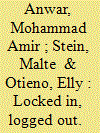

|
|
|
|
|
| Summary/Abstract |
This article examines the impact of the pandemic on ride-hailing drivers and their mitigation strategies during lockdown in Africa. Ride-hailing has emerged as one of the latest paid-work opportunities for the continent's many unemployed. Yet, ride-hailing companies such as Uber and Bolt misclassify drivers to avoid regulation and responsibilities towards workers’ welfare. Drawing on 34 in-depth interviews with ride-hailing drivers, driver representatives and trade unions in South Africa and Kenya, this article makes two arguments. First, the gig economy in Africa provides work opportunities for the unemployed on the continent and simultaneously vitiates the working conditions through the commodification and informalisation of work. Second, the state-directed emergency measures act as a veneer to capital's efforts to commodify labour and the gig economy platforms have emerged as primary tools for it. Our account points to an urgent need for better regulatory systems to hold platform companies accountable and a collective bargaining mechanism in the gig economy.
|
|
|
|
|
|
|
|
|
|
|
|
|
|
|
|
| 18 |
ID:
165377


|
|
|
|
|
| Summary/Abstract |
Refugee response planners no longer frame Syrian refugees merely as objects of humanitarian care. Increasingly they are portrayed as enterprising subjects, whose formal integration into labor markets simultaneously can create self-sufficient actors and cure the economic woes of host countries. However, bringing together humanitarian and economic agendas is not an easy task. This article analyzes the contradictions and frictions that have emerged in the process of implementing the Jordan Compact, a political commitment to integrate Syrian refugees into the formal Jordanian labor market, and which is supposed to showcase such win-win strategies. It argues that the Jordan Compact should be seen as a policy model that has achieved enough consensus and incorporated enough disparate objectives to be labelled a ‘policy success.’ Yet, central actors have neglected core features of Jordan’s political economy and labor market, and/or the lives and survival strategies of refugees, such that their radical blueprints of transformation have been disrupted. Despite the widespread commitment to the scheme, it is thus unlikely that the Jordan Compact will both reinvigorate the Jordanian economy and offer Syrians the prospect of a dignified, self-sufficient life, an important lesson for comparable schemes being rolled out across the globe.
|
|
|
|
|
|
|
|
|
|
|
|
|
|
|
|
| 19 |
ID:
171127


|
|
|
|
|
| Summary/Abstract |
Along with other globalizing forces such as migration and proselytism, religious markets have played a key role in the transformation of religious practices in Armenia. This article focuses on the intersection of mobility and markets through mobile fairs, which are temporarily organized at shrines on pilgrimage days. Market vendors tend to travel from shrine to shrine across Armenia throughout the year, each following his or her own trajectory. In this article I examine how such markets are organized, how and by whom they are run and controlled, how small-scale mono-confessional markets become part of transnational globalization processes, and how the marketplace is embedded in the pilgrimage ritual, changing and modernizing its traditional meanings and structure.
|
|
|
|
|
|
|
|
|
|
|
|
|
|
|
|
| 20 |
ID:
123371


|
|
|
|
|
| Publication |
2013.
|
| Summary/Abstract |
The end of the cold war witnessed the emergence of a commercial web sprawling from the Xinjiang Uighur Autonomous Region in western China and extending into Central Asia (Kazakhstan, Kyrgyzstan, Tajikistan, Turkmenistan, and Uzbekistan), Pakistan, and Russia. Running parallel to the state-managed exchange in hydrocarbons, raw materials, technology, and infrastructure, this new Eurasian trade had an informal component as everyday consumer items manufactured in China were imported into neighboring countries, bypassing formal regulatory mechanisms. This inter-Asian trade began as shuttle trading by itinerant merchants for local markets; by the mid 1990s, shuttle trading was overshadowed by large-scale export for national markets in neighboring countries without losing its informal character. This informality extending across national boundaries defined the post-cold war commerce in innermost Asia; at the same time, it also signaled a return to pre-cold war trading structures. Moving away from the "retreat of the state" thesis that found traction following the cold war, the author attributes informality in this inter-Asian trade to three factors: (1) a restructuring of state power where informal trade was a new comparative advantage sought in an evolving geopolitical climate; (2) the actors in this inter-Asian trade - party and regional officials in China, along with traders and intermediaries - who found and exercised agency through this exchange; and (3) a chain of inter-locking, commercial macro-regions, which are economically sustainable and which transcended international boundaries. Working in conjunction, these factors constitute a dynamic inter-Asian trade and challenge static state imaginaries of a "New Silk Road" or "Eurasian Continental Bridge."
|
|
|
|
|
|
|
|
|
|
|
|
|
|
|
|
|
|
|
|
|